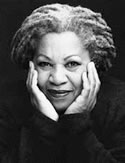The Reader As Artist

The words on the page are only half the story, says Toni Morrison. The rest is what you bring to the party.
Mr. Head awakened to discover that the room was full of moonlight. He sat up and stared at the floor boards—the color of silver—and then at the ticking on his pillow, which might have been brocade, and after a second, he saw half of the moon five feet away in his shaving mirror, paused as if it were waiting for his permission to enter. It rolled forward and cast a dignifying light on everything. The straight chair against the wall looked stiff and attentive as if it were awaiting an order and Mr. Head's trousers, hanging to the back of it, had an almost noble air, like the garment some great man had just flung to his servant…. The above opening to a short story by Flannery O'Connor is, to readers content with grasping information, straightforward enough. It introduces a character, Mr. Head, waking up at night and noticing moonlight. To readers who enjoy the practice of reading, the opening is much, much more.
Two approaches seem to me the difference between reading as a skill and reading as an art. The first is quite enough. From knowing what STOP means through understanding a scholarly essay or a legal brief, the necessary skill varies greatly, can always be refined, and lets us negotiate life with some measure of control. Reading as art, not Art (once, depressingly called "critical" reading) is another matter. Like the avid devotion to other arts, it develops over time in any number of ways, takes all sorts of routes, and has many origins.
My own reading skills were enhanced in schools, but my pleasure in, my passion for the art of reading came long before. It came in childhood and it began with listening. Not only was I a radio child who grew up in the decades when radio was paramount, when being mesmerized by the dramas and reenactments from a speaker box was commonplace, I was also surrounded by adults who told stories, reshaped and solicited them from each other as well as their children. The result was a heavy reliance on my own imagination to provide detail; the specific color of things, the feel of the weather, the space characters occupied, their physical features, their motives, why they behaved as they did, and especially the sound of their speech, where so much meaning lay. Listening required me to surrender to the narrator's world while remaining alert inside it. That Alice-in-Wonderland combination of willing acceptance coupled with intense inquiry is still the way I read literature: slowly, digging for the hidden, questioning or relishing the choices the author made, eager to envision what is there, noticing what is not. In listening and in reading, it is when I surrender to the language, enter it, that I see clearly. Yet only if I remain attentive to its choices can I understand deeply. Sometimes the experience is profound, harrowing, beautiful; other times enraging, contemptible, unrewarding. Whatever the consequence, the practice itself is riveting. I don't need to "like" the work; I want instead to "think" it.



